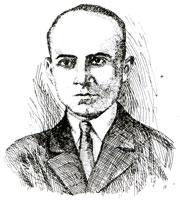Konstantin Fyodorovich Chelpan (Russian: Константин Фёдорович Челпан; 27 May 1899 – 10 March 1938) was a prominent Soviet engineer of Greek background. Head of the Engineering Design Bureau of the Kharkiv Locomotive Factory, chief designer of the T-34 tank engine. Awarded the Order of Lenin, he was politically repressed and executed under a mass persecution ordered by Joseph Stalin, but politically rehabilitated after death.
Konstantin Chelpan | |
|---|---|
Константин Челпан | |
 | |
| Born | 27 May 1899 Cherdakly, Yekaterinoslav Governorate, Russian Empire |
| Died | 10 March 1938 (aged 38) |
| Resting place | Unknown |
| Nationality | Soviet |
| Education | Kharkiv Technological Institute |
| Occupation | Engineer |
| Children | Lenimir Konstantinovich Chelpan |
| Parent(s) | Fyodor Myhailovich Chelpan, Elizaveta Khalangot |
| Engineering career | |
| Discipline | Diesel engines |
| Institutions | Kharkiv Locomotive Factory |
| Significant design | V-2 engine |
| Awards | Order of Lenin |
Early life and education
editBorn on 27 May 1899 in Cherdakly, Yekaterinoslav Governorate, Russian Empire (now Kremenivka, Donetsk Oblast, Ukraine),[1] to Fyodor Myhailovich Chelpan and Elizaveta Khalangot.[2] Both parents were Greeks.[1]
After graduating from Mariupol Realschule in 1919, took part in the Russian Civil War.[2] In 1924, he graduated with honors from Kharkiv Technological Institute with a major in internal combustion engines.[2][3]
Career
editFrom 1924 to 1937 Chelpan worked at the Kharkiv Locomotive Factory[3] as a Designer, Head of the Diesel Department, Lead Designer, and Head of the Engineering Design Bureau.[4][5] In 1928–1929 he received practical training in Germany, Switzerland, and the UK.[2]
Konstantin Chelpan was the head designer of the famous T-34 tank diesel engine V-2,[6] for which he was awarded the Order of Lenin.[7] The engine consisted of lightweight aluminum alloy.[8][9][10][11]
From 1927, he was a senior lecturer at Kharkiv Technological Institute.[12]
Arrest and death
editKonstantin Chelpan was arrested on 15 December 1937 during the first days of the Greek Operation of NKVD.[1][2][11] He was charged with leading a Greek nationalist counter-revolutionary organization, as well as conspiring to sabotage the Kharkiv Locomotive Factory.[1][11] After being interrogated and tortured, he confessed to being a spy.[2] On 4 February 1938, he was sentenced to execution by shooting.[2][3][11] The sentence was carried out in Kharkiv prison on 10 March 1938[2] and covered up.[1] In a few years his wife received a death certificate, indicating that Konstantin Chelpan died on 16 May 1942 from congestive heart failure.[1]
On 6 August 1956, Konstantin Chelpan was rehabilitated by the Military Collegium of the Supreme Court of the USSR.[2][3] However, only in 1988 was his true cause of death revealed.[1][11]
Commemoration
edit- In 1994 one of the streets in the village of Cherdakly was named after Konstantin Chelpan.[2]
- In 2000 a book entitled Life story of famous Ukrainian Greeks. The case of Konstantin Chelpan by G. Zakharova was published.[2]
- In 2001 a commemorative plaque was placed on the house, where Konstantin Chelpan had spent his last years.[2]
References
edit- ^ a b c d e f g Лавриненко, Евгений (January 2011). "Челпан Константин Федорович". аллея звезд (in Russian). Archived from the original on 9 August 2013. Retrieved 19 February 2012.
- ^ a b c d e f g h i j k l Захарова, Г.М. (2001). Жизнеописания знаменитых греков Украины. Дело Константина Челпана (in Russian). Мариуполь : ЗАО «Газета "Приазовский рабочий. pp. 54–85.
- ^ a b c d Джуха, И.Г. "Челпан К.Ф." ГРЕЧЕСКИЙ МАРТИРОЛОГ (in Russian). Archived from the original on 8 December 2015. Retrieved 19 February 2012.
- ^ Ибрагимов, Даниял (1989). Противоборство: Документальная повесть (in Russian). ДОСААФ СССР. p. 59. ISBN 5-7030-0200-1. Retrieved 19 February 2012.
- ^ Джуха, Иван; Ассоциация греческих общественных объединений России (2006). Греческая операция: история репрессий против греков в СССР (in Russian). Алетейя. p. 50. ISBN 5-89329-854-3. Retrieved 19 February 2012.
- ^ Костюченко, Станислав (2004). Как создавалась танковая мощь Советского Союза, Книга 1 (in Russian). АСТ. ISBN 5-17-024396-0. Retrieved 19 February 2012.
- ^ БУГАЙ, НИКОЛАЙ; КОЦОНИС, АНАТОЛИЙ (1999). Обязать НКВД СССР ... выселить греков (in Russian). ИНСАН. pp. 159, 164. ISBN 9785858402886. Retrieved 19 February 2012.
- ^ Suzuki, Takashi (1997). The romance of engines. SAE. p. 206. ISBN 1-56091-911-6. Retrieved 19 February 2012.
- ^ Комитет по делам архивов. Министерство печати и информации (2001). Отечественные архивы, Выпуск 1 (in Russian). Отечественные архивы. p. 63. Retrieved 19 February 2012.
- ^ Ziemke, Earl (2002). Stalingrad to Berlin: The German Defeat in the East (Paper). Government Printing Office. p. 27. ISBN 0-16-001962-1. Retrieved 19 February 2012.
- ^ a b c d e "Сталинский "греческий заговор"". ГРЕКИ В РОССИИ (in Russian). ГРЕЧЕСКАЯ ГАЗЕТА. Retrieved 19 February 2012.
- ^ Павлова, Г. В. "Челпан Константин Федорович". История Харьковского технологического института в лицах 1885-1930 (in Russian). Archived from the original on 11 July 2012. Retrieved 19 February 2012.